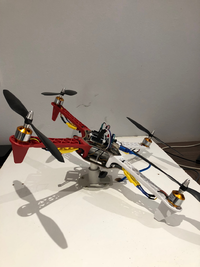Difference between revisions of "Quadcopter"
From Chemical Engineering @ UP wiki
| Line 4: | Line 4: | ||
==2018 - Jonathan van Niekerk== | ==2018 - Jonathan van Niekerk== | ||
'''Build''' | '''Build''' | ||
| − | [[File:QuadRig.png|200px|left|thumb]]The quadcopter is based on a commercially available F450 frame and Arduino Uno controller. A LiPo battery provides flight autonomy of about 15 min and the high current capacity required by the motors. The motors are fitted with 1045 propellers capable of providing the required thrust force to overcome gravity The measured angles are derived from a gyroscope and accelerometer mounted on the quadcopter base. | + | [[File:QuadRig.png|200px|left|thumb]]The quadcopter is based on a commercially available F450 frame and Arduino Uno controller. A LiPo battery provides flight autonomy of about 15 min and the high current capacity required by the motors. The motors are fitted with 1045 propellers capable of providing the required thrust force to overcome gravity. The measured angles are derived from a gyroscope and accelerometer mounted on the quadcopter base. |
'''Modelling''' | '''Modelling''' | ||
| − | + | The quadcopter is modelled mathematically based on angular velocity, Euler kinematic, velocity and position state equations. A linear model is derived based on small angle deviations around the point of equilibrium. Step test experiments are performed to validate the mathematical model, and curves fitted to obtain the transfer functions. | |
'''Control''' | '''Control''' | ||
Update control info. | Update control info. | ||
Revision as of 11:29, 12 November 2018
Introduction
The quadcopter rig consists of a quadcopter mounted on a stanchion. The control objective is to regulate the speed of the motors to maintain a hover position that is horizontal to the rig's base plate.
2018 - Jonathan van Niekerk
Build
The quadcopter is based on a commercially available F450 frame and Arduino Uno controller. A LiPo battery provides flight autonomy of about 15 min and the high current capacity required by the motors. The motors are fitted with 1045 propellers capable of providing the required thrust force to overcome gravity. The measured angles are derived from a gyroscope and accelerometer mounted on the quadcopter base.Modelling The quadcopter is modelled mathematically based on angular velocity, Euler kinematic, velocity and position state equations. A linear model is derived based on small angle deviations around the point of equilibrium. Step test experiments are performed to validate the mathematical model, and curves fitted to obtain the transfer functions.
Control Update control info.
